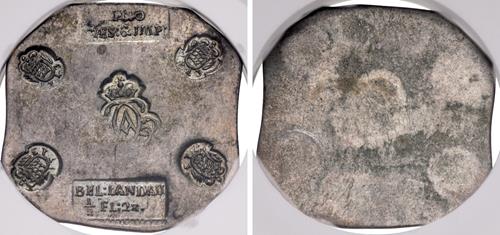|
WAR OF THE SPANISH SUCCESSION, Germany. Landau. Besieged by Marshal de Villars, 1713. AR 1/2 Florin 2 Kreuzer (29x29mm). Dated 1713. Stamped with the coat-of-arms of Karl Alexander, Duke of Württemberg, two rectangular stamps reading PRO/ CÆS : & IMP : and BEL : LANDAU/ 1/2 · FL : 2X, and four crowned monograms / Blank. Korchnak 316; Maillet pl. LXIX, 9; KM 11. Toned. In NGC encapsulation 1911607-012, graded AU 55.
From the Michael Cassick Collection of Siege and Emergency Coins, purchased from Jonathan Kern, June 2007. Includes an old 19th century German collection ticket.
In 1701, a Grand Alliance against Louis was established. Consisting of England (after 1707, Great Britain), the Dutch Republic, and the Holy Roman Empire, their candidate was Charles, the son of Leopold I. By this point, however, the Empire was weakened by the increasing independence of German states within it. Now, Catholic Bavaria allied itself with France.
William III, Louis’ chief rival, had died shortly after the war began. His sister-in-law Anne succeeded him. The new queen relied on John Churchill, the 1st Duke of Marlborough, as her commander. His victories at Blenheim, Ramilies, Oudenaard, and Malplaquet, sealed his reputation as a great general. By 1710, however, the situation was at a standstill. Churchill’s victories in the Low Countries were offset by the Alliance’s defeat in Spain. The war’s cost made it unpopular in Britain. The succession of the Alliance candidate to the throne of Austria made an Austro-Spanish union no better to Britain than the Franco-Spanish one that made them join the Alliance in the first place. Now, with the Tories in power, the administration of Robert Harley initiated peace talks with France and ceased active military participation, much to the consternation of Churchill and the Whigs.
Without British support, the other Allies were forced to make peace. Under the treaties of Utrecht in 1713, and Rastatt and Baden in 1714. Phillip renounced his claim to the French throne and was confirmed as King of Spain. Spain retained is overseas possessions, while their European territories were divided between Austria, Britain, and Savoy. In the long run, Britain emerged as the leading European maritime and commercial power, bringing to an end almost a century of Dutch influence and the end of the Dutch Republic as a major power. The break-up of the Holy Roman Empire continued, paving the way for the creation of more powerful German states, most notably Prussia.
The final winners of all Triton XXV lots will be determined at the live public sale that will be held on 11-12 January 2022. Triton XXV – Session Four – Early Medieval & Islamic Coinage through Large Lots will be held Wednesday afternoon, 12 January 2022 beginning at 2:00 PM ET.
Winning bids are subject to a 20% buyer's fee for bids placed on this website and 22.50% for all others.
We recognize that our users may have various Internet Browsers and Operating Systems. We like our visitors to have the best possible experience when using our bidding platform. However, we do recognize that it is impossible to develop applications that work identically, efficiently and effectively on all web browsers. The CNG bidding platform supports the latest stable major version and the stable previous version of Mozilla Firefox and Chrome.
|
